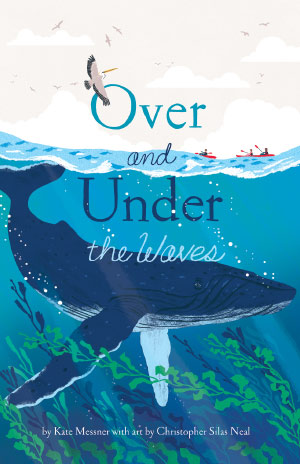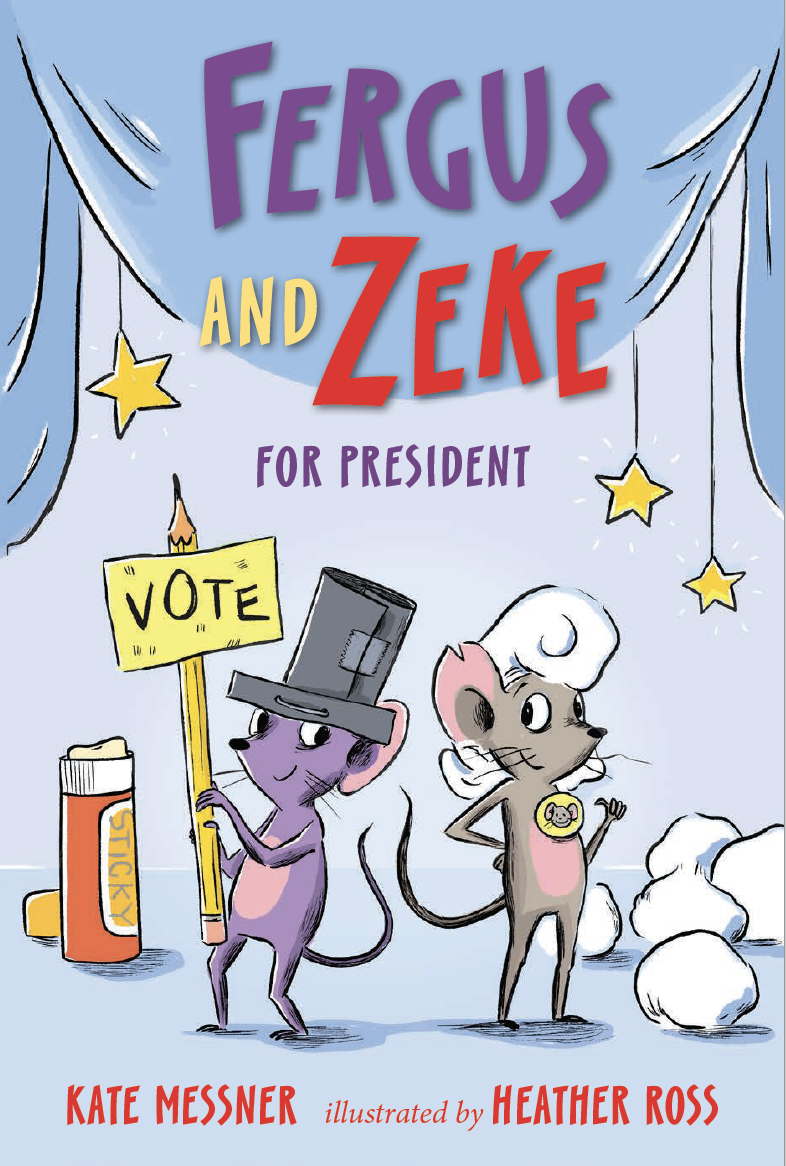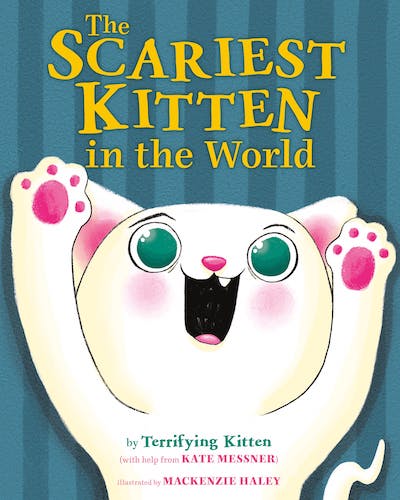Now that we’ve been writing together for a couple of weeks, it’s possible that the shiny newness of writing camp is starting to wear off. Maybe you’re looking at your notebook, looking at some of the writing samples shared in comments, and having some doubts about your work. One great solution to that is checking in with Jen on Sundays at her blog Teach Mentor Texts, where you’ll find plenty of support and encouragement.
Today’s guest essay tackles that topic, too. Our visiting author is Kristen Kittscher, a former middle school English teacher and author of the tween mystery The Wig in the Window (Harper Children’s, 2013) which garnered a starred review from School Library Journal and was named to ten Best of the Year lists. Kristen lives with her husband in Pasadena, home of the Rose Parade—the inspiration for her most recent novel, The Tiara on the Terrace. She joins us today to talk about what to do when we’re doubting our work.


Battling—and Deafeating!—Your Inner Critic
Greetings! By this point in the summer, you are in the thick of things and have been soaking up much wisdom from Kate and her fabulous guest faculty. Hopefully the lessons have inspired you and, slowly but surely, you’re hitting your stride as you work toward your goals. If that’s the case—stop reading now! Wait for more brilliant words of advice tomorrow.
But if you are finding yourself having trouble gaining and keeping momentum as you write, I thought I’d share some of the usual demons that block my own progress – and strategies for shutting down those negative voices.
1. “I just don’t have enough time.”
When I first started writing, it took me a while to recognize that – more often than not – this lie was my self-doubt masquerading as a practical concern. To beat it, I followed the advice in Dorothea Brande’s brilliant book Becoming a Writer religiously. There’s not enough space to outline her technique here, but basically? Set a time each day – at first for just fifteen minutes – and write anything during that time, even if it’s to complain about not being able to write. Lock away the pages and don’t look back until a week or more passes. When you’ve done that successfully, increase the time and keep at it. It sounds like you’re doing nothing, but in fact, you’re training your unconscious to flow more readily when you need it to. It works. If you’re really having trouble, give it a shot! (Julia Cameron outlined similar techniques later in her The Artist’s Way, which might also be helpful to you.) Other tips: wake up a half hour earlier and write before you do anything else.
2. “My writing isn’t good enough.”
Maybe your writing isn’t good yet. Who cares? It’s not time to judge yet. No one asks a friend who just took up the oboe when she’ll be playing for the New York Philharmonic, but tell a friend you’re writing a novel, and a second later he’ll be breathlessly musing about your being the next J.K. Rowling. It doesn’t make any sense that writing would be different from any other craft, but culturally we (and others) seem to expect it will be. Whether or not you’re any good yet is immaterial. You can only get better – and it’s spending the time that will make you so.
3. “I’m not really very creative.”
Hogwash. Think of the last vivid dream you had. Your unconscious was capable of making all that up, wasn’t it? Writing is simply finding better ways to bring the rich reserves of your unconscious into your conscious mind – where you can give it cohesive form.
4. “How can I be sure this is even worthwhile?”
You’ll never be sure. Even when and if it’s published! Sharing a book with readers is a wonderful, magical experience—and of course our goal with any writing project is to communicate and connect with others—but you will never really know for sure how you are really connecting. The writing and process is the worthwhile part. If you don’t find it so—stop now. Really. You’ll be miserable otherwise.
5. “This will take forever. I’ll never finish.”
Maybe it will take forever. But time will pass whether you finish your writing project or not. It’s really up to you if you’d like to have a finished manuscript by the end of that time passing. If you wrote 500 words a day for five months, you’d have 80,000 words. That’s the length of a typical YA novel. No one’s saying they’ll be usable words, but they’ll be there for you to work with, no matter what. Your inner critic might offer up very different allegedly “practical” concerns, but as long as you remember that most negative voices are either others’ beliefs that you’ve internalized – or your own efforts to impede your unconscious – you’ll get better and better at shoving them aside.
A caveat: if, no matter what, you’re finding it hard to gain a sense of flow, consider that perhaps your unconscious knows something you don’t and that the resistance is serving a real purpose. You might be experiencing some life turmoil, grief, other changes that really make it impossible for you to create right now. And that’s all right. There’s more to life than writing. I think?
Hope you can shut off your critic, enjoy your writing, and absorb some more of the wise words of wisdom to come!





Kristen!!! THIS is exactly what I needed this morning! Thank you! I have to keep reminding myself that just the motions I go through to be creative help me to be more alive. The other reminder I give myself is to be less worried about what will be with my WIP and more about getting the story told, even if only my Mom and two other writer/teacher friends are the only people to read it. Enjoy your Sunday!
Dana
Your courage to persist with your goal in getting your story told inspires me, Dana. We should definitely plan to connect and share our writing and experiences.
I’m so glad these words could rouse you, Dana! And I love the you put that about creativity making you feel more alive. There are reasons to write far beyond completion and publication, and those reasons can carry us through.
I totally agree. Comment #2 struck me as well. We need to give ourselves permission to play and explore with our writing. Getting away from the thought that everything I write “must” be publishable really helps to chip away at the writing block. Thanks for sharing your writing lessons, Kristen.
Kristen,
Thanks for sharing with us. I really appreciated the comment about giving yourself time to learn about writing. I don’t think we allow ourselves the freedom to believe writing takes practice like leaning anything new does. We are sometimes our own worst critics and that can take the fun out I the writing and what good is that? Thanks again for sharing.
Martha, seeing you at camp every day is helping me to feel part of a writing and learning community. It is wonderful to learn with and from you.
It’s funny, isn’t it, how somehow people think writing is different – I think that’s because we are all writing lots all the time (if your email box is anything like mine!) But it’s far more than stringing words together – and a craft that can be learned like anything else. Glad you’re writing away!
Thank you Kristin! I know all this, I do, I really do! And yet… I even more desperately need to be reminded from someone outside my head that even 15 minutes of writing is more significant than 0 writing and hours of avoiding… Thank you.
Terry
Thank you very much for these words of encouragement Kristin! It’s good to be reminded that we are not alone in our struggle or our possible insecurities. This community of writers is very supportive which enables us to grow together. The one statement that I’ve had lately is the second one, “My writing isn’t good enough”. Honestly, I feel that insecurity because it’s probably true. As a second language learner, I’m continually second guessing my writing abilities in both my native language and in English. However, I know that only through actually doing something, do we ever get better. This takes a lot of vulnerability. But as psychologist and author Brene Brown says, “Vulnerability is not about fear and grief and disappointment. It is the birthplace of everything we’re hungry for.” Thank you again for this post.
I’m glad the words of encouragement could help, Daniela. Yep, we have to always add that word “yet” at the end (or question whether we’re being too harsh. And wow: though I speak other languages, I cannot imagine writing fiction in one of them! My hat is off! Enjoy your Sunday, and keep plugging away!
Terry, I know this writer personally: the “0-writing-and-hours-of-avoiding” writer is one i have been working on defeating. I’m finding it easier to beat that writer on most days, but I still circle back to the critic voices that cause me to become that writer all over again. Thanks for sharing your thoughts.
This was such an encouraging post! Thank you for the much-needed reminders.
Thank you for this post. My fear has always been writing. That I’ll never be good enough. I am doing this for my students. If I can push through and share with them my struggles, I hope they will be willing too!! Thank YOu!!
I’m inspired just hearing this. Think of how many fear to take up the struggle – and celebrate that you are!
Great post! Many thanks!
Thank you for the encouraging words! We educators are such a multi-tasking lot….and sometimes I wonder if the teaching life takes advantage of that ability in us and works it into some of our flaws!
One of the “things” I struggle with is getting distracted with writing prompts and ideas. I seem to have a wide/shallow body of work but want to develop my wip to a full mss.
Have a great week and keep writing!
I think it does: especially since as teachers we have overdeveloped muscles of evaluating and analyzing. We’ve got to trick those muscles and get out of our own way! Happy writing to you.
Linda, I totally agree with you as I have been wondering the same thing. I’ve started to jot down the day’s mini-lesson or prompt to revisit later if necessary but am committed to getting work done on WIP.
Linda — something went screwy with my comment and posted before I finished! I know that feeling, and I think Tracy’s advice is excellent. Prompts are great for developing a regular writing practice — sort of like a warm-up before a sports game — but if you’ve got a WIP going and you’re sitting down, by all means, precious minutes should be spent there. If you get stuck, though, sometimes you can take a prompt and apply it to your WIP. One tool I find good for that is John August’s Writer’s Emergency Pack: it gives prompt to help you shake up your thinking about your drafts: http://writeremergency.com/
Thank you so much for this post. I needed to be reminded to continue the journey even on days I am struggling with the quality.
Glad it could keep you going!
Good morning, Kristen!
Great post! I am stuck on #2 (“My writing isn’t good enough.”). At least in the sense of being published. I am finishing up a chapter book manuscript that I am very proud of. I’ll send it out, but I am not hopeful.
I am hopeful and excited to share parts of it (maybe more) with my students in the fall. I have a lesson on writing voice that I will use it with. I have a lesson for ideas and word choice. My own mentor text.:) All is not lost.
I’m a Teachers Writer lifer. If it wasn’t for Teachers Write, I would not have shared any of my writing with anyone (and I wouldn’t be writing this post). Every summer, I walk away with something (well, usually I walk away with lots of somethings). I love everything about teaching (I teach 6th grade) and my dream job would be a head librarian at a middle school, so writing is the extra thing that I love to do.
Your demons and strategies for shutting them down is just what I needed. Sometimes, I’m stuck on a part of a story that takes me weeks to get through (usually I do walk away from it for a time period) and I question my love of writing. Once the words get flowing again, my love is renewed.
THANK YOU for your wisdom and strategies that I will take with me.
Happy writing!
I’m so glad, Andy! And it’s inspiring to me to hear this – and know that I’m frequently in the same boat, as are the writing friends I talk to. And as for not being hopeful, I often feel that way: then I remember that, sadly, there’s no protecting myself from disappointment if it comes, so might as well hope and dream away! (Easier said than done)
Great post! thank you for writing this. I have been debating with topics of writing a book and I keep coming up with ideas that have already been done. That definitely gets discouraging. I know that I need to do more writing with my students this year and I hope to use it as a bonding experience with them and I write into the day with daily prompts with them as well.
Are there any general activities that I can do with the class to generate topic lists for the kids in the beginning of the year so they can put that in their notebook and have it there for them incase they get writer’s block like i do?
I have the writing heart, i have words that they are, their favorite words, their favorite’s list, but I am running out of ideas. How much is too much?
I can think more about this (I’m at a rest stop on route to nerdcamp Michigan!) but I find that doing lots of short timed writing prompts can generate a lot of material. I highly recommend Natalie Goldberg’s books for prompt ideas. Also, having a student tell a short anecdote from their life to the class, then showing how to tweak it by asking the question, “What if…”? can get story ideas going fast. (Have them build upon it by adding “and then” / “but” / “so” and keep cycling through. That helps things from being episodic.
In general, I think constraints and structure can lead to the most creative ideas! Feel free to contact me through my website for more ideas. And happy writing to you!
Oh and also: everything HAS been done…but not like how you would do it. The one thing we each have going for us is that we’re originals:-)
Hi Kristen,
Thanks for the encouragement! I feel like most of these thoughts are swimming around in my brain every time I sit down to write. It’s helpful to be reminded that I am not alone in these doubts and I love your strategies for shutting them down. You’ve definitely inspired me to write my way through the doubt this week! Tracey
“Writing your way through doubt” – I love that! Also doubles as a memoir title… keep on keeping on!
Wow! What a breath of fresh air. I had to stop and take down some notes because your words were very inspirational. I will join others and write through the doubt! Thanks again Kristen,
I’m so glad, Rachel!
Great timing and greatly appreciated! I just shifted to first person POV and have to weave in a new setting and shorten chapters and feel overwhelmed and underskilled! A swim, a walk, and butt in seat will recharge the brain cells! Thank you!
It sure will – and like swimming, a little faith that the water will keep you afloat goes a long way…
I have a book that I self published in 2011. Even today I doubt myself as to whether it is good enough. It is used in several schools in my district as part of the curriculum. As I work on revisions on my second book, and writing my third I am working to get them in a position to query them for traditional publishing. I still face the doubts and lies. Your post is a reminder to actually face our fears and our doubts. Thank you for reminding us and giving us some tips.
Isn’t it funny that our own critics can be so fierce that we won’t even accept objective proof that what we’ve done connects? Yes, the naming and facing of fears goes a long way to silencing them when we need to!
Kristen, I started here first thing, and then had to run before writing a few words of thanks. (Hopefully you’ll get to see them.) All of the negative messages you listed have lived in my head, sometimes all at once. The beauty of Teachers Write is that I’ve learned I’m in good company, which has helped me build courage and stamina. But, still I have to battle those critics in my brain. I will keep your words close at hand so as to have greater powers the next time a battle presents. And, I will save them to lift up my student writers when they face those voices of doubt and help them see that they are in good company. Thank you!
Hi, Dalila! I’m so glad you took the time to comment. You’re so right: the company is what helps the most. Without a community (like what brilliant Kate has created here), it’s really hard to keep at it and keep improving! The critic side of ourselves is helpful, too, but not when it comes to creating. I’m so glad these words helped — and that your students might find them helpful, too!